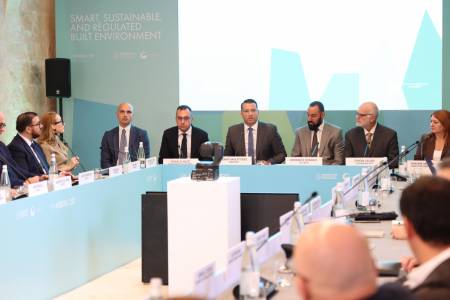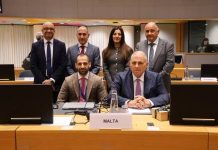The Minister for Justice and Construction Sector Reform Jonathan Attard addressed the conference ‘Envision 2050: Smart, Sustainable and Regulated Built Environment’, where he emphasised the importance of a stronger voice for the citizen and higher competences in the reform and consultation process in the construction sector. “Citizens should have a stronger voice in the consultative process in the sector,” said Minister Attard, while stressing the new dimension that the Building and Construction Consultative Council (BCCC) should take.
The Minister argued that there is a need to look at how this council, which until now has been a forum for consultation between stakeholders, becomes a key instrument of public participation. The Minister recalled that the construction industry was in a situation where it was determined that it had 50 years to recover, and therefore the Government is working on a structured and sustainable reform process. “This is the beginning of a new culture, one that embraces competence, ethics and quality,” the Minister continued, while mentioning the main measures that have already come into force as well as those that are currently being worked on.
Among them are the National Building and Construction Code, which will be introduced gradually over three years, the licensing of contractors, and the introduction of Skill Cards by 2027. He also mentioned new services such as the 138 helpline, free lawyers and architects, and joint inspections with OHSA. Minister Attard also spoke about sustainability initiatives such as the grant schemes trained by the BCA, and the use of technology both in the sector and in the work of the Authority itself in its regulatory function.
Minister Attard concluded by inviting all stakeholders and public entities to be an active part of this transformation process. “You present here represent our collective commitment to building a future where construction in Malta is truly smart, sustainable and driven by sound and responsible regulation.”
Among the topics discussed during this meeting were the Code and standards related to construction, licensing, worker regulations, building quality and compliance, construction site management, digital innovation in construction, schemes related to cleaner energy in buildings and building materials, among more topics related to buildings and construction.
Chief Executive of the Building and Construction Authority, Architect Roderick Bonnici, who chaired this meeting, explained that in order to be in possession of a skill card one must have taken a health and safety awareness course and must also verify that they possess a particular skill. Architect Roderick Bonnici said that the Authority aims to promote sustainable practices in construction. He explained that this goal goes hand in hand with that listed in the Vision 2050 document. “As an Authority, we are seeing that the sector is evolving with today’s practices and technologies. To this end, the Authority is working and placing great emphasis on educating all parties involved in the sector, whether professionals, contractors, builders or manual workers working in this sector. In the last year, the Authority started with a system that brings all parties together and discusses the evolution of the industry, so that we can take a more holistic approach to the challenges of today and the future,” concluded Architect Bonnici.
Permanent Secretary Ronald Mizzi, responsible for the Coordination and Implementation of Vision Malta 2050 within the Office of the Prime Minister, praised the approach to the discussion. He stressed that such discussions look at the future of our buildings, what materials we will use and in which areas, with what skills and investments needed, sustainable energy, emissions and building codes. The event brought together a large number of stakeholders, constituted bodies, partners and this shows the commitment of our country towards this discussion that will lead us on this journey to 2050, based on the quality of life.
Present at this meeting were representatives of the Occupational Health and Safety Authority, the Planning Authority, the Environment and Resources Authority, the Chamber of Architects, the Chamber of Engineers, the Chamber of Construction Project Managers, the Department of Civil Protection, the Police Force, the Demolition and Excavation Contractors Association, the Builders and Contractors Association, the Malta Developers Association, the Property Market Agency, Enemalta, the Water Services Corporation, Transport Malta, LESA, the Department of Local Government, Infrastructure Malta, the Superintendence of Cultural Heritage, the Climate Change Authority, the University of Malta, MCAST, the Building and Construction Advisory Council and the Regional Councils of Malta and Gozo.
![]()








